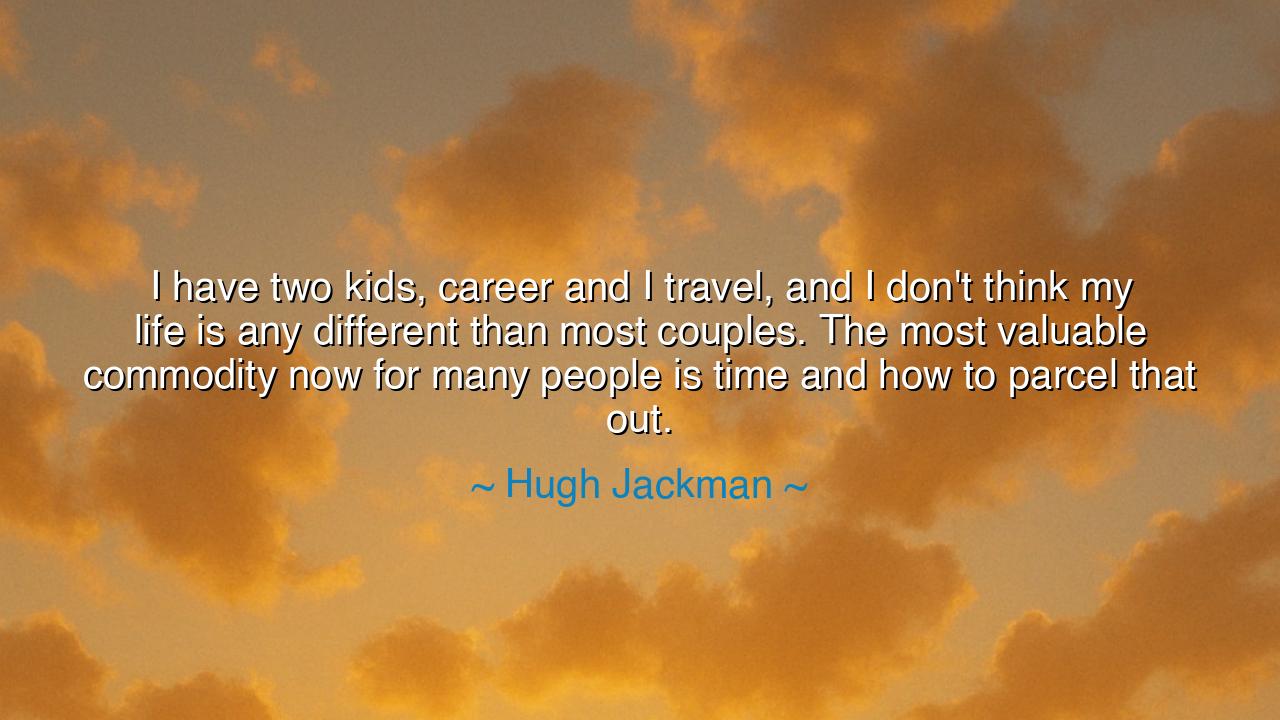
I have two kids, career and I travel, and I don't think my life
I have two kids, career and I travel, and I don't think my life is any different than most couples. The most valuable commodity now for many people is time and how to parcel that out.






In the words of Hugh Jackman, both actor and father, we are given a truth both ordinary and profound: “I have two kids, career and I travel, and I don’t think my life is any different than most couples. The most valuable commodity now for many people is time and how to parcel that out.” At first glance, these words seem like the musings of a busy man balancing family and work. But if we linger on them, we find ancient wisdom: that in every age, no matter the wealth or fame, the greatest treasure is not gold nor power, but time itself—and how one chooses to spend it.
To speak of kids, career, and travel is to name the pillars of modern life. These are the forces that shape our days: the bonds of family, the labors that sustain us, and the movement that broadens our horizons. Yet Jackman declares his life “no different than most couples,” reminding us that beneath fame and fortune lies the same struggle all share—the struggle to balance love, duty, and the endless demands upon the clock. In this humility lies the echo of the ancients, who knew that kings and commoners alike were subject to the passage of the sun.
The heart of his reflection lies in the phrase: “The most valuable commodity now for many people is time.” Commodity once referred to trade goods—grain, oil, salt—those things without which life could not be sustained. By likening time to such goods, Jackman elevates it to the highest treasure, for while grain can be harvested and oil drawn again, time once lost cannot be recovered. The ancients carved sundials and built great calendars not for vanity, but because they knew: the stewardship of time is the stewardship of life.
History bears witness to this truth. Consider Marcus Aurelius, emperor of Rome, whose every hour was consumed by war, governance, and duty. Yet in his Meditations he often wrote of time’s fleeting nature, reminding himself that each moment wasted in distraction was a moment stolen from virtue. “Do not act as if you had ten thousand years to throw away,” he wrote. Jackman’s reflection echoes this same spirit: that how one parcels time—how one divides it between work, family, and self—determines the quality of life more than wealth or fame.
The image of parceling out time is especially evocative. It recalls a merchant carefully dividing grain into measures, ensuring that each portion is given rightly. So too must we divide our hours, for if too much is poured into work, love withers; if too much is spent in leisure, duty fails. Balance is the art of the wise, and without it, the days crumble into chaos. The ancients spoke of moderation as the golden mean—neither excess nor deficiency, but the measured allotment of life’s hours.
And yet, the challenge is not in knowing that time is precious, but in living as though it is. Too often we imagine life as endless, and so we waste hours in trivialities, only to look back in sorrow at what is lost. Jackman’s words remind us that even the busiest life, filled with travel and achievement, must pause to weigh how time is given. For children grow, families change, and careers rise and fall—but the time neglected can never be restored.
The lesson is clear: guard your time as you would your most precious treasure. Do not give it all to one pursuit, nor let it slip away unnoticed. Choose how you parcel it with intention: give to your loved ones the hours of presence, to your work the hours of duty, and to yourself the hours of renewal. In this balance lies not only success, but peace.
So I say to you: measure your days as the ancients measured grain. Time is your wealth; spend it wisely. Let not the noise of the world steal it from you. For in the end, a man is not remembered by the gold he gathered, but by how he spent his hours—whether in love, in service, and in living fully the brief gift he was given beneath the turning of the sun.






AAdministratorAdministrator
Welcome, honored guests. Please leave a comment, we will respond soon